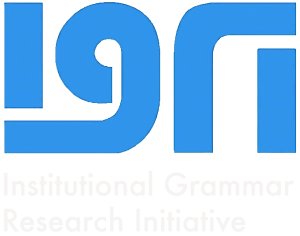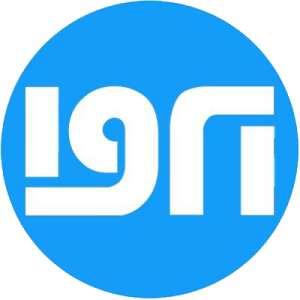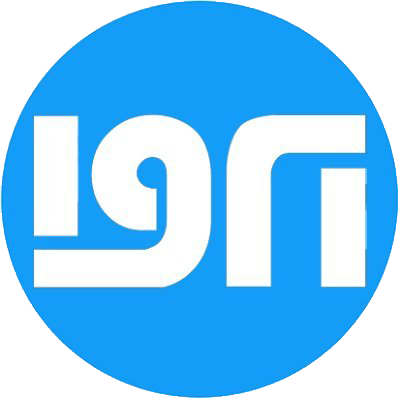IGRI Working Groups bring together scholars and practitioners around a shared interest related to the development and application of the Institutional Grammar. The Working Groups are an opportunity to share research, provide and receive feedback, and collaborate on projects. Working Group participants are additionally encouraged to present their work at relevant IGRI events, such as the research seminars and the virtual conference. The IGRI provides logistical and coordination support to the Working Groups, but otherwise the Working Groups are independently organized and managed by their respective members.
Prospective Working Groups can include, but are not limited to, the following topics:
- Challenges and Critiques of the Institutional Grammar — addressing responses to the IG and alternative approaches
- Teaching the Institutional Grammar — exploring pedagogical approaches to introducing students to the IG
- Constitutive Rules — advancing the analysis of constitutive rules
- Informal Rules — studying informal rules with the IG
If you are interested in setting up a Working Group, please contact IGRI Coordinator Davor Mondom.
Active IGRI Working Groups
The grammar of rules-in-use: Collecting and analyzing institutional statements from in-depth qualitative interviews, focus groups, and participant observation
This group will focus on discussing the design of efficient tools for collecting rules-in-use from ethnographic research, including in-depth interviews, focus groups, or participant observation. The goal is to create a protocol for collecting and later using the grammar to codify rules-in-use. The specific objectives are:
1) Share experiences in collecting rules-in-use
2) Design the elements of an interview/focus group guide to correctly collect institutional statements, maximizing the number of grammar elements and minimizing the need to use “by default” conditions.
3) Discuss rewards and sanctions in rules, norms, and strategies (direct, emotional, and tangible consequences).
4) Design an open access protocol for collecting and analyzing institutional statements from qualitative ethnographic research.
A frequency of bi-monthly meetings is anticipated. Most meetings will be virtual, but opportunities for face-to-face meetings will be used. Activities will include participating in the online meetings, sharing experiences, and collaboratively creating the protocol for the study of rules-in-use. The protocol will be open access and co-authored by all members of this working group who actively participated in the meetings and writing of the protocol.
Host: Irene Pérez Ibarra, University of Zaragoza, Spain
Contact: perezibarra@unizar.es
Current members:
- Alicia Tenza Peral (University of Zaragoza, Spain)
- Diego Arahuetes de la Iglesia (University of Zaragoza, Spain)
- Daniel William Detzi (University of Arizona, USA)
- Ute Brady (Arizona State University, USA)
- Giorgia Trasciani (Politecnico di Milano, Italy)
The Institutional Grammar in Spanish
The goal of this working group is to adapt the Institutional Grammar 2.0 to the Spanish language and Hispanic contexts. In this group we will discuss how best to translate the grammatical elements into Spanish, for example the deontics and the aims verbs. The final goal is to prepare an introduction to institutional grammar (undergraduate level) in Spanish. This document will be useful for students and researchers who are dealing with the Institutional Grammar for the first time.
A frequency of bi-monthly meetings is anticipated. Most meetings will be virtual, but opportunities for face-to-face meetings will be used.
Co-hosts: Irene Pérez Ibarra and Alicia Tenza Peral, University of Zaragoza, Spain
Contact: perezibarra@unizar.es and atenza@unizar.es
Current members:
- Diego Arahuetes de la Iglesia (University of Zaragoza, Spain)
- Tomás Olivier (Syracuse University, USA)
- Esteban Arribas Reyes (University of Alcalá, Spain)
The Institutional Grammar in Chinese
This working group aims to bring together scholars interested in applying Institutional Grammar 2.0 in Chinese contexts. In this working group, scholars can share their ideas and experience on how to adapt Institutional Grammar 2.0 to research projects on Chinese institutions. By creating a community to connect ideas and foster discussions, we want to systematically translate the grammatical elements into Chinese and create a comprehensive guideline for research on Chinese institutions. We firmly believe that fostering communication among scholars and undertaking nuanced analysis of Chinese documents can yield benefits for academia as well as practical applications.
A frequency of bi-monthly meetings is anticipated. Most meetings will be virtual, but opportunities for face-to-face meetings will be used.
Co-hosts: Jun Zhang and Shiyang Xiao, Syracuse University, and Difen Lin, Fujian Academy of Administration
Contact: jzhan328@syr.edu, sxiao11@syr.edu, and difenlin@163.com
IG-SRSG Working Group: Advancing an Institutional Grammar of the “State” to Study State-Reinforced Self-Governance
This panel will convene an interdisciplinary team of Institutional Grammar (IG) and State-Reinforced Self-Governance (SRSG) researchers to explore novel ways to apply the IG to study key concepts of SRSG. The methods needed to analyze formal policy documents, and informal rules-in-use, in order to evaluate SRSG are currently underdeveloped. Utilizing the strength of the IG to measure key concepts, this group will seek to develop methods to study SRSG via collaborative case studies, laboratory experiments, and various computational approaches (e.g., social network analysis, agent based models) that integrate IG and SRSG analytics. We also seek to inform and define basic concepts necessary for the conceptualization and assessment of SRSG, such as the “State”, “State power”, and design principles of adaptive and transformative capacity, and how these are represented and exercised within in/formal institutional designs and processes. Our goal is to develop standard research protocols for the analysis (coding and interpretation) of policies and key informant interviews, for the study of SRSG and development of the IG by the broader scientific community.
We plan to meet monthly to discuss organizational needs and bi-weekly or on an as-needed basis for individual projects (to be decided by team leaders and collaborators). Meetings will typically be online, with in-person meetings when the opportunity arises.
Host: Daniel A DeCaro, University of Louisville, USA
Contact: daniel.decaro@louisville.edu
Co-Organizers (alphabetical):
- Emmanuel Frimpong Boamah (University at Buffalo)
- Ute Brady (Arizona State University)
- Daniel A DeCaro (University of Louisville)
- Christopher Frantz (Norwegian University of Science and Technology)
- Tanya Heikkila (UC Denver)
- Saba Siddiki (Syracuse University)
- Shuping Wang (Syracuse University)


